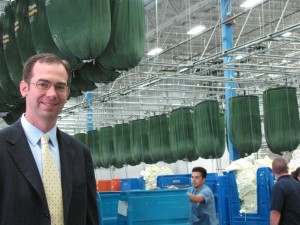Sheet mettle

Before Pampers, there was Max Potack, delivering freshly laundered diapers to frazzled mothers via horse and wagon in 1915. He”™d be astounded today to see what became of his Bronx-based venture.
The company he founded has continued to thrive into the 21st century as Unitex and is now run by his grandson Michael and great-grandsons David and Michael.
With 11 locations in the New York metropolitan area, the Newburgh-based Potacks are literally awash in linen, from receiving blankets to hospital gowns. Servicing large hospitals, including, Mt. Sinai, Memorial Sloan Kettering and St. Luke”™s-Cornwall, to small private practices, Unitex hauls away the dirty laundry and replaces it with freshly laundered linen to the tune of 1.2 million pounds a week.
The family, which had a smaller location in the village of Monroe, started looking for a place to expand in 2006. “This land was originally just a grassy front yard owned the Newburgh Banana Company,” said David Potack of its city of Newburgh site. “It wasn”™t for sale, but we told the broker to make the owner an offer. What attracted us was its location and the fact that it was an untouched piece of property, a rarity for any city.”
With Unitex”™s offer accepted, plans were sketched out for the 60,000 square foot facility. As an Orange County Industrial Development Agency project, Unitex received help buying its state-of-the-art laundering machinery with a savings on the sales tax for the equipment.
The company services clients in New York, Connecticut, New Jersey, Pennsylvania, Massachusetts and Rhode Island. With one of its plants in Middletown and one that closed in Monroe in 2006, the Potacks were comfortable with Orange county and found what they believed was the right location: a city with an available workforce, easy access to the appropriately named “Bos-Wash” corridor and a pristine piece of land on which to build.
Unitex, officially opened its $20 million facility in May 2008, just before the crash took down the economy; but the Great Recession didn”™t slow down the need for hospitals and doctors to have a supply of sheets, gowns, blankets and other items that need to be clean and available immediately.
“We have a tractor trailer of linen coming in from Mt. Sinai and a freshly laundered supply going back to them seven days a week” said Potack, “That”™s just one of over 3,500 clients we serve out of our 11 locations here in the metro area.”
Newburgh is the company”™s first totally automated facility, where trucks filled with hospitals”™ dirty linens pull into bays to be unloaded, weighed and sent through a system that separates, washes, sanitizes and dries. Employees feed clean linen through machines that iron and fold them. The freshly laundered linen”™s final destination is back into the sanitized containers and shipped out to clients.
A computerized system of conveyor belts carries bags of dirty laundry to one area and returns clean laundry to another. Constant maintenance keeps the system working with precision, tracking how many pounds are taken in, washed, dried, pressed, folded and re-loaded with uncanny accuracy. Employees work a 10-hour shift four days a week. “They like the three-days off, and we are open from 7:30 a.m.-5:30 p.m. seven days a week. Hospitals never have a day off, and neither do we.”
Dave Potack was one of the business owners who gathered around the table at the Railroad Playhouse (see related article) to discuss the recently formed Greater Newburgh Partnership, where city-owned business owners are seeking a change to the way business is run by the city to Newburgh. “We use a million gallons of water a week in our business,” said Potack. “The city”™s decision to raise water rates by 30 percent has a profound effect on us.
“With over 200 employees, many who have been with us for 15 or more years and live and work in Orange county, we are not a ”˜portable”™ business. We can”™t just pick up and leave. We need to see new management come into the city, make it a safe environment for its families and workers and an attractive location for business. Most of the businesses there had less than 25 employees. We should have been one of the ”˜little guys”™ but we are one of the city”™s biggest taxpaying employers.”
As for the city itself, David said, “We”™ve seen too many cuts made in the wrong places, and nothing is changing; despite the attempts that have been made, the city is going nowhere. It”™s time for someone else to step up and take it over, whether it is a receivership or some other form of management. A city like this, with all its potential, should be on par with our neighbors across the river in Beacon. We”™re ready to see it happen and to make it happen any way we can.”